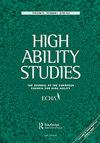天赋异禀、才华横溢、成绩优异的学习者的自律学习
IF 1.8
4区 教育学
Q2 EDUCATION, SPECIAL
引用次数: 4
摘要
本期《高能力研究》专刊聚焦于天才、天才和高成就学生自我调节学习(SRL)的理论和研究的最新进展。在下文中,我们阐述了特刊的目标和结构,并强调了贡献的显著特点。本期特刊的主要目的是将概念和实证研究结合起来,重点关注天才、天才和高成就学习者的SRL。贡献者包括心理学家和教育研究人员,他们都在动机和学习过程领域分享广泛、互补的研究经验。事实上,很少有学者是SRL和天赋理论与研究的专家,只有少数学者从事后一领域的交叉研究。因此,我们的大多数贡献者更多地与动机和学习过程联系在一起,而不是与天赋和高能力研究联系在一起。尽管他们的专业背景各不相同,但所有贡献者都迎难而上,将他们的专业知识应用于天才教育。我们很高兴地说,其结果将对所有关注这些科学研究领域关键交叉点的研究人员和从业者大有裨益。特刊由十篇文章组成,全部由SRL领域经验丰富的研究人员撰写,并对Phil Winne的论文进行了深入讨论。这些文章侧重于SRL的不同方法(例如,关于SRL过程的基础研究、天才学生的SRL和干预研究)、人才领域(学校科目、专业领域和专业领域)和学习环境(学校、大学和专业环境),并采用了各种方法(定性、定量和混合方法)。特刊的编辑们感谢作者们的贡献,也感谢敏锐的审稿人,他们仔细阅读并反馈了稿件。此外,还要感谢Albert Ziegler博士发起了这期特刊,并感谢Bettina Harder博士加快了编辑过程。本文章由计算机程序翻译,如有差异,请以英文原文为准。
Self-regulated learning in gifted, talented, and high-achieving learners
This special issue of High Ability Studies focuses on recent advances in theory and research on self-regulated learning (SRL) in gifted, talented, and highachieving students. In the following, we explicate the goals and structure of the special issue and highlight salient features of the contributions. The major aim of this special issue is to bring together conceptual and empirical research focusing on SRL in gifted, talented, and high-achieving learners. The contributors include psychologists and educational researchers, all of whom share extensive, complementary research experience in the areas of motivation and learning processes. Indeed, few scholars aremavens in both SRL and giftedness theory and research, and only a handful work at the intersections of the latter fields. Consequently, the majority of our contributors is more associated with motivation and learning processes than with giftedness and high-ability research. Despite their different professional backgrounds, all contributors rose to the challenge of applying their expertise to the context of gifted and talented education. The result of which—we are pleased to say—will be of great benefit for all those researchers and practitioners concerned with the crucial intersections of these areas of scientific inquiry. The special issue consists of ten articles, all written by seasoned researchers in the area of SRL, and an in-depth discussion of the papers by Phil Winne. The articles focus on different approaches to SRL (e.g., basic research about SRL processes, SRL in gifted students, and intervention studies), talent domains (school subjects, expertise areas, and professional fields), and learning settings (school, university, and professional settings) and employ various methodologies (qualitative, quantitative, and mixed methods). The editors of the special issue are grateful to the authors for their contributions as well as to the astute reviewers, who carefully read and gave feedback on the manuscripts. Also, thanks is due to Drs. Albert Ziegler for initiating the special issue and to Dr. Bettina Harder for expediting the editorial process.
求助全文
通过发布文献求助,成功后即可免费获取论文全文。
去求助
来源期刊

High Ability Studies
Multiple-
CiteScore
4.80
自引率
11.10%
发文量
7
期刊介绍:
High Ability Studies provides a forum for scholars in a variety of disciplines associated with the development of human abilities to their highest level. It is a medium for the promotion of high ability, whether through the communication of scientific research, theory, or the exchange of practical experience and ideas. The contents of this journal are unique in reflecting concerns and recent developments in this area from childhood and across the whole life span in a variety of contexts. Far from being restricted to the traditional focus on high-level cognitive development, it also presents investigations into all other areas of human endeavour, including sport, technology, the arts, business, management and social relations.
 求助内容:
求助内容: 应助结果提醒方式:
应助结果提醒方式:


